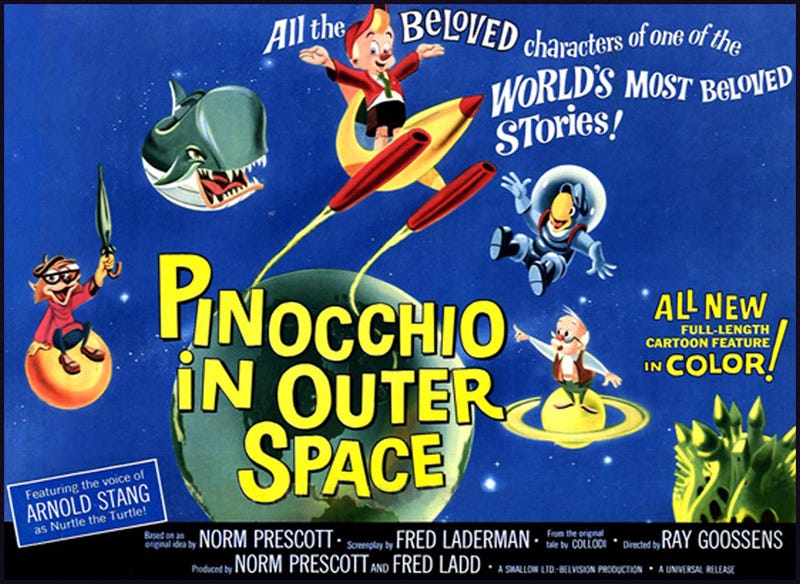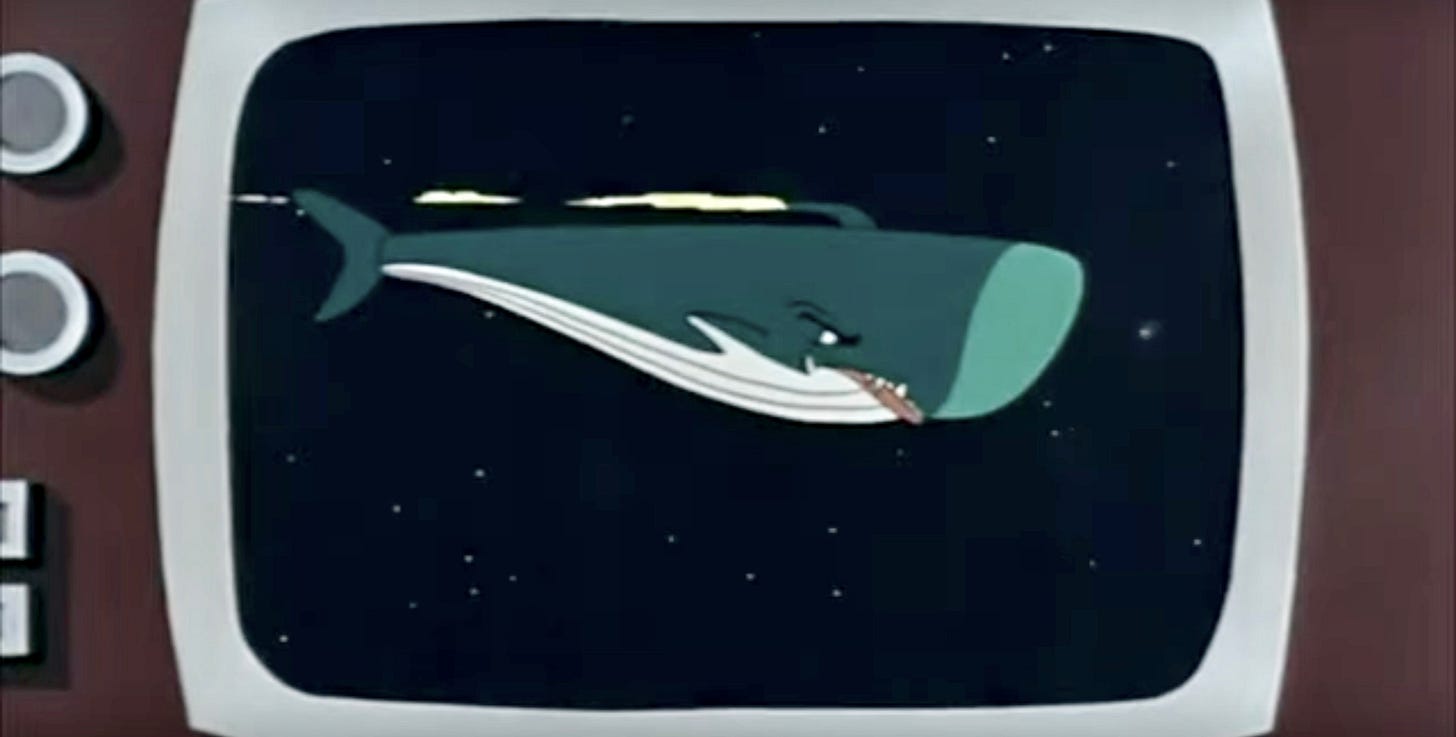Something Streaming This Way Comes: "Pinocchio in Outer Space"
There’s no way to write this piece without coming across as an old man, so I’m just going to go ahead and embrace it and say that, when I was a kid, we didn’t have it as easy as today’s kids do when it comes to watching movies. Not only was the internet not yet a thing, but until right around when I was entering my teens, I also grew up without the advantage of having either cable or a VCR. As such, I was limited to whatever movies were on TV, whatever movies my parents took me to see, or—on rare occasions—whatever movies they might show after school. That’s right: in my day, your parents would sign a permission slip so that you could stay after school, at which point they’d have a projector set up and they’d show a film…like, say, a forgotten classic called Pinocchio in Outer Space.
It will probably not surprise you to learn that Pinocchio in Outer Space was not an official sequel to the classic Disney animated film. No, it’s one that took advantage of the fact that the character of Pinocchio was in the public domain and then use it as opportunity to expand on his adventures. In this instance, they didn’t expand them very far in terms of length, since the resulting film only ran for a grand total of 71 minutes, but it certainly expanded things in terms of locale.
This is a very strange film, but it’s an endearingly insidious one, since—despite its title clearly promising otherwise—it spends the majority of its first 20 minutes by trying to convince you that it’s going to be following the same general mold as the Disney film, albeit slightly updated. It ostensibly picks up not too long after that film left off, but as Pinocchio explains, he’s done some backsliding since then in terms of being a good boy, resulting in him having been returned to being a puppet.
Also, you’d think that this shift had resulted in Jiminy Cricket giving Pinocchio the cold shoulder, since not only is he nowhere to be seen, but he’s not even mentioned. This, of course, is because Jiminy wasn’t exactly in the original version of The Adventures of Pinocchio, which is to say that although there was a cricket in the story, he didn’t have a name beyond “the Talking Cricket,” and at one point when he tries to impart some advice, Pinocchio throws a mallet at the cricket and kills him.
Yes, really. Look it up.
With that said, however, we still have Pinocchio’s “father,” Geppetto, who’s still as loving as ever despite his “son” having misbehaved to such a degree that he’s literally lost his humanity. We also see the devious fox and cat again, except instead of “Honest” John Worthington Foulfellow and Gideon, we get Mr. Sharp and Mr. Groovy, the latter looking and acting like a stereotypical beatnik.
Their presence is ultimately just to introduce a plot element for use later—they run into Pinocchio while he’s on a walk and convince him to fork over 15 cents for a pamphlet that ostensibly teaches him the art of hypnosis—but the entire segment revolving around Pinocchio’s walk also provides an opportunity for the film to provide a few songs. Are they great songs? They are not. But they’re just catchy enough to piss you off…and, frankly, isn’t that really all you can ask of an animated film?
Now, it occurs to me that I neglected to mention a brief moment that occurs right before the film spends the better part of its first 20 minutes trying to pretend that it’s delightfully Disney-esque, and that’s when it offers a ridiculously casual introduction to a completely insane plot point. It’s delivered by a newscaster, and I kid you not, this is a word-for-word transcription:
“We interrupt this program to bring you a special bulletin: the newest man-made satellite, Cosmos II, launched earlier this evening, has been demolished, smashed into rubble by Astro, the rogue whale in outer space!”
This news report about Astro quickly tackles how he’s destroyed several satellites at this point, indicates that his origins are unknown, and pointedly mentions that they’re offering a reward for his capture. Never explained: why they’d bother offering a reward for a rogue space whale when it’s 1965 and literally no one watching the broadcast is in a position to ever take advantage of it.
By the way, Astro is clearly intended as a callback to Monstro, the whale from the Disney film, but I can’t begin to imagine even the always-litigious Disney wanting to get involved in a lawsuit over that situation. (“Oh, I’m sorry, did I miss the scene where Monstro uses his rocket spout? Your honor, these are very different whales!”)
Maybe the best part about this exposition dump comes when Geppetto turns off the report before it’s completely finished and muses, “Strange times, Pinocchio. A whale in outer space!” But that’s a cinematic father figure for you: he keeps such a cool head that his reaction is like a man who’s just seen a commercial for a new Lay’s flavor than a news report about a goddamned space-faring behemoth.
But as I mentioned, this is just an offhanded moment before Pinocchio in Outer Space spends a several-minute stretch pretending that it’s never going to leave the comfort of Mother Earth. It isn’t until just after the 20-minute mark that the tonal shift begins and Pinocchio is introduced to the other major character of the film: Nurtle, a space-faring secret agent who looks like a turtle but who actually identifies as a Twurtle, probably because Nurtle the Turtle is a little too close to Dr. Seuss’s Yertle the Turtle, whereas Nurtle the Twurtle is so completely dissimilar that there’d never be any confusion.
But I digress.
As it turns out, Nurtle has accidentally landed on Earth while trying to land on Mars, and when he leaves, Pinocchio goes with him, resulting in the ride of a lifetime both for the puppet who longs to be a real boy and for the viewer. Granted, the science of this film is absolutely bonkers, but the designs of Mars, its creatures, and its technology are gorgeous. I don’t really even want to go into too much detail about the sights that Pinocchio and Nurtle happen upon when they get to Mars, except to say that there’s a degree of tension once they venture underground that still holds up for me as well as it did when I was a kid.
Granted, maybe that’s just because I remember how much it affected me then, but I don’t think that’s entirely it. There’s definitely some downright spooky shit going on, and many mysteries about the Martians, their technology, their experiments with genetic mutations, and why they’re no longer anywhere to be found are pointedly left unsolved. Seriously, Nurtle just writes it all off by saying, “I guess we’ll never know why.” Well, fair enough, then. But it doesn’t make it any less creepy.
Eventually, Pinocchio and Nurtle leave Mars, encounter Astro on their way back to Earth, there’s the obligatory scene where they’re swallowed and have to escape, and then they eventually bring back the aforementioned plot thread about Pinocchio’s hypnotism lessons. Long story short, there’s a happy ending that more or less brings the status quo back to where things were at the end of the Disney film, but we know what really happened after that. WINK!
Anyway, I don’t know if you’ll actually want to watch Pinocchio in Outer Space in its entirety, although 71 minutes isn’t exactly a major time investment, but I definitely recommend that you at least bounce around it a bit so that you can see some of these moments that I’m talking about. This is the sort of warped kiddie programming that made me the man I am today, for better or worse, and it’s nice to be able to show it to you and say, “I know, it sounds crazy, but THIS REALLY WAS A THING THAT I GREW UP WATCHING!”






